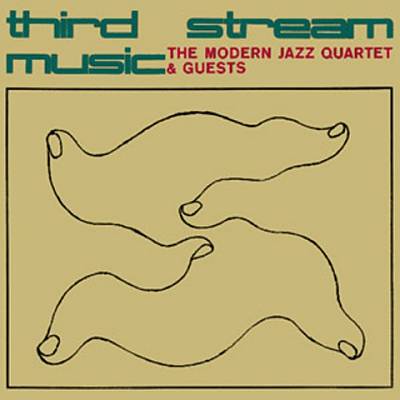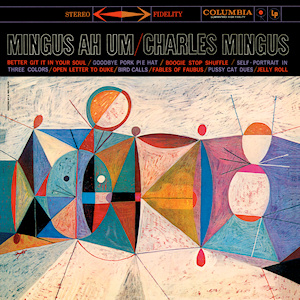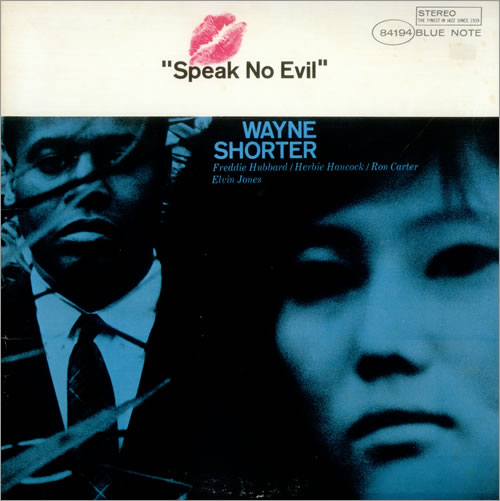(Hoisted from comments on Tom’s thread re-exploring LP-listening in the age of the no-longer moored individual song)
So Tom had put Sketches of Spain by Miles Davis on his list, and in response the thread had discussed the mechanics of politics of tokenism: some idea how and why SoS so often ends up as a rock or pop listener’s one trusty jazz LP, and some suggestions as to better candidates. Inevitably, I ended up getting pre-emptively grumpy about Miles’s Kind of Blue, and was called on this. What’s my actual beef with KoB? And, given this beef, where I would I suggest starting? These were my semi-mulled thoughts, tidied up, with extras added, and responses to responses further down…)
My basic beef with Kind of Blue:
 the short version (set out at speed) is i suppose this: that it is a sly, niggling, jittery record of odd subtle hard-to-pin-down not-very-nice emotions and evocations, which depends for its expressive intent on the listener having a pretty solid familiarity with the music of its day and what went before, for its devices and effects to come across properly (most famously the introduction of the modal approach to harmony, the details and purpose of which i’ve watched seriously learned and articulate musicians struggle to explain coherently or usefully)
the short version (set out at speed) is i suppose this: that it is a sly, niggling, jittery record of odd subtle hard-to-pin-down not-very-nice emotions and evocations, which depends for its expressive intent on the listener having a pretty solid familiarity with the music of its day and what went before, for its devices and effects to come across properly (most famously the introduction of the modal approach to harmony, the details and purpose of which i’ve watched seriously learned and articulate musicians struggle to explain coherently or usefully)
and yet it has somehow become the stand-alone representative of the form it is on the whole sardonically setting itself against: something about the way it’s been made — its constituent parts, its presentation — exactly and completely masks this subtly hostile aspect of it, to the extent that it’s instead become a kind of nice-to-hear-in-the-background chill-out classic, which in my opinion suggests a flaw in its conception or execution: that it can’t (or anyway doesn’t) draw the newbie into its darker heart
i don’t think it’s bland or diluted, exactly the opposite — but there’s something about it that allows it to be excerpted from its somewhat snidey role in a larger conversation, and set up on a plinth that puts the rest of this conversation into shadow if not oblivion… which annoys me! miles was never not an argumentative man: he disliked a lot of the work his peers were making, but this almost always meant he came round to his own version of this work by another route
if my musicological chops were less rusty i’d write this up in more detail — tho if/when i attempt this will probably then merge itself into my long-awaited ever-expanding epic dissection of rattle and hum (the “angel of harlem” volume) –:D
[Expanding a bit: i don’t think it's an accident the record’s called KIND OF blue, or that the first song is called “so what”; i think there's deliberate misdirection going on. In one sense Miles remained the black face of the cool school, its prior enabler -- but the cool school was already controversial by the mid-50s, as a whitening of jazz (on-stage as well as conceptually) and Miles never had much time for the way his own (white) fans understood his music. I think there’s mindfuck going on here -- it’s never been a record I can just put on in the background -- and it’s not as he wasn't above sledging his own sidemen, even the loyal, long-term ones. Plus he favoured elision and ellipsis temperamentally -- he was never a flamboyant virtuoso and from time to time had harsh things to say about this side of jazz (Coltrane didn’t know when to take the sax out of his mouth etc; various beloved maximalist figures were “greedy”). So to me this is totally a problematic candidate for an “all you need to know is here, and hey! it’s ME!” (quite apart from the fact that this sentence is even less in the spirit of jazz in any era than the idea that composed or recorded contributions best typify it). Besides, there isn’t an era of the jazz he lived through that Miles wasn’t at odds with as he lived through it -- which is not an uninteresting fact, but it does mean that you have to know something about what he might be at odds with in any given moment to follow where he's taking it. And he sure as shit isn’t going to talk you through this dimension: he’s much more likely to remove explanatory props than supply them, just as he did with musicians, getting the performances he wanted not by discursive exploration among equals, but by undermining headfuck, borderline bullying, and sustained personal opacity. He is a great man! But he is neither a direct nor a generous artist; and much of his direction is counter-direction.]
The issue of homework:
Not unreasonably, Tommy Mack came back and asked if I was therefore saying that to understand jazz, you have to arrive (as tommy’s brother insists) with a well informed ear (implication: to understand any of it, you have first to listen carefully to the entirety of jazz in the historical order it was made). This isn’t quite what I meant.
i should add that my general view is not your brother’s! i don’t think you need to do lots of homework before jumping into jazz at any point other than the start: but i also think there are good and bad records to jump in at, and kind of blue is — for me, for the reasons given, not a good one (not least because it seems to end up being the first AND ONLY for so many ppl, which is i think telling)
i tried to put together a quick list of records that would be better places to start in roughly this era — obviously this cleaves to my own tastes (no coltrane) but i don’t think any of these are these days controversial or quirky or contrarian; all of them are strong and striking just in themselves, obviously you get more out of them if you do know more (this is true of everything) but you don’t need a run up.
Adding: what this list attempts to do is provide better routes into the whole of jazz, with the proviso that we’re starting from roughly this point, viz c.1956-64, rather than say 1921-29 or 1935-45 or 1967-75. All of these other startpoints are fine (any startpoint is fine!): all of them will run into their own difficulties. My task here is to outline and endrun the specific difficulties that starting with a LP from c.1956-64 likely runs into. In particular this means any given suggestion has to take into account salient issues in the jazz of the day, trends and beefs and so on, without assuming the newbie listener has any sense of same or orientation within same: in terms of immediate interest and (if you listen closely and often) exploration and development, the records present as stand-alone; you can learn everything you need to know, provided you’re alert and patient and have a goodish natural sense of aural recognition. They’re kind of a beginner’s portal and an advanced masterclass rolled into one. The list is down-page: before I get to it I’ve tried to flesh out my decision-making.
[this^^^ par edited a little on 21.2.15 in light of enitharmon’s comments below: it was clearer in the original discussion than it is here that i absolutely think there are multiple routes into jazz -- including hers! which was listening to live jazz as a kid made by people she knew! -- and that this exercise is about minimising the obstacles and maximising the potential if you decide to enter jazz via this specific portal]
Format wars!
The key development — the arrival in 1948 of the 33-third vinyl long-playing microgroove record — is discussed in the comments on the earlier thread, by me here and (somewhat argumentatively) here and here: I won’t c&p this here tho by all means request or initiate discussion (and disagreement!) in the comments below. Columbia’s reasons for the new format were better sound (vinyl is less brittle and more durable than shellac) and longer playing time (the microgroove fit more playing onto the same 12 inches; the initial vibrations were smaller so had to be amplified much more, but not-quite-paradoxically this also allowed for more subtlety of variation to be picked up by the new diamond needle). Columbia initially had the new format in mind for classical audiences bored with getting up 6-8 times per symphony to flip or change a 78: and while it offered great potential for jazz musicians to spread out and explore, a particular peril arrived with this — essential that the “serious content” arrived in hock to the values and listening habits of middlebrow classical listeners. Improvisers were already playing creative games — in far more curtailed listening spaces — with echo and anticipation, variation and juxtaposition, so the greater space and complexity wasn’t itself a surprise: but there was a danger that the imposition of classical form was obscuring the value already there. And of course jazz from the teens to the 40s had been brash, because cutting through the noise of a nightclub or a scratchy 78 surface was essential to being heard. Vinyl allowed you to play softly also: sonority or arrangement luxuriated in this new velvety richness of possibility; if quietness was never mistaken for quality, its absence was sometimes taken as a lack of it.
(No accident — as Ward Fowler gently jokes below — that bachelor pad loungecore also started here.)
Against the cool
 Sometime around 1957, musician-scholar Gunther Schuller coined the term “third stream” to categorise music that (as a later time would put it) explored a fusion of classical and jazz elements. Now “classical” potentially covers all composed music from Gesualdo to Varèse; jazz by the mid-50s included everything from King Oliver up to if not quite including Cecil Taylor; Schuller had a more delimited territory in mind, hard to pin down w/o getting deeper into the weeds than I plan to here (he definitely saw it as covering Ellington and Strayhorn as well as Charles Mingus). Still — enabled by the new technology (and by the ever-increasing numbers of non-self-taught jazzbos who’d had first-class musical educations: Miles himself went to Juilliard, tho of course he also dropped out before completing his studies) — this was an encounter that was bound to happen; and one that was bound to get intensely politicised, in the era of civil rights struggle and the beginning of the drawing down of legal segregation in the US. On one hand, jazz was “black” and classical was “white’; on the other, there should be no bar wharever to black musicians entering white cultural enclaves, and presumably vice versa; on the third (problematic) hand, white musicians playing what was considered half-assed pseudo-classical jazz seemed to getting the lion’s share of the attention, the approval and the paycheques. (Brubeck as first jazzer on the cover of Time magazine was very much a “zap! bam! comics are not just for kids anymore!” type phenom, for example, marking the apparent enthronement of the cool school as the one that entailed genuine grown-up seriousness worthy of yr sunday arts supp attention…)
Sometime around 1957, musician-scholar Gunther Schuller coined the term “third stream” to categorise music that (as a later time would put it) explored a fusion of classical and jazz elements. Now “classical” potentially covers all composed music from Gesualdo to Varèse; jazz by the mid-50s included everything from King Oliver up to if not quite including Cecil Taylor; Schuller had a more delimited territory in mind, hard to pin down w/o getting deeper into the weeds than I plan to here (he definitely saw it as covering Ellington and Strayhorn as well as Charles Mingus). Still — enabled by the new technology (and by the ever-increasing numbers of non-self-taught jazzbos who’d had first-class musical educations: Miles himself went to Juilliard, tho of course he also dropped out before completing his studies) — this was an encounter that was bound to happen; and one that was bound to get intensely politicised, in the era of civil rights struggle and the beginning of the drawing down of legal segregation in the US. On one hand, jazz was “black” and classical was “white’; on the other, there should be no bar wharever to black musicians entering white cultural enclaves, and presumably vice versa; on the third (problematic) hand, white musicians playing what was considered half-assed pseudo-classical jazz seemed to getting the lion’s share of the attention, the approval and the paycheques. (Brubeck as first jazzer on the cover of Time magazine was very much a “zap! bam! comics are not just for kids anymore!” type phenom, for example, marking the apparent enthronement of the cool school as the one that entailed genuine grown-up seriousness worthy of yr sunday arts supp attention…)
Schuller had proposed the term (at least in part) to take some of the political heat out of underlying situation: classical and jazz dudes were both getting territorial about experiments in combination that they felt were encroaching on the excellence of their favoured side. A third recognised zone could perhaps evolve in its own pace at its own way without threatening to spill over into and taint anyone’s considered values. And several figures in Miles’s various projects were good Schullerites and active Third Streamers. Pianist John Lewis had been a key player-composer in Miles’s original Birth of the Cool sessions (he’d co-founded the Modern Jazz Quartet in 1952; in 1960 the MJQ put out a collection called Third Stream Music). Teo Macero had worked with Schuller and Lewis before he teamed up with Miles.
Schuller was/is a front-rank musicologist and historian: always worth reading even when his tastes (or tone) bug you. If he wanted to act as an aesthetic peacemaker, though, he was hopelessly naive. Too much rankled; too many felt shut out. As styles, hard bop and soul jazz both functioned as resistance to the alleged deracination of cool or third stream (but also sometimes fallback and retreat: as invaluable training grounds for many excellent players who only flourished and found themselves after they left). Long story short: an LP from either side of this divide selected as a route into all jazz requires a better history lesson than ^^^this of the divide to operate as introduction; a self-consciously “third stream” item even more so.
The prisonhouse of harmony (a bit technical tho I’m doing my best that it not be)
If you’ve read Pynchon’s Mason & Dixon (or watched the middle two Pirates of the Caribbean movies), you’ll recognise the idea that the imposition on the entire globe of the full latitude-longitude grid changed the nature of travel-as-flight-out: in a very real sense, an adventurer always now knew where they were, and could increasingly draw on reliable accounts of what they’d find there. Quests became a matter more of careful pre-planning — and filling in small gaps on the map — than leaps into the unknown: and the tenor of the tales that followed changed along with this.
Something not dissimilar happened in music: twice, actually. In the 17th century, the 24 Preludes and Fugues of the Well-Tempered Klavier, J.S.Bach had helped establish the latitude-longitude grid for tuning and travels in harmony; by Wagner’s day, the adventures had changed in nature, PotC-style. Previous tuning systems had exactly tuned the home key (usually C major) by the cycle of fifths method; this meant meant that distant keys (like F# major) sounded super-weird, all its proportions wrong. Bach had pioneered a system of conventional mistunings and adjustments that allowed every key to sound in tune — each with its distinctive nudged flavour — and thus allowed harmonic modulation within quite short pieces to take you to remote keys without breaking the extant rules. The extant rules provided a logic within which note and chord choices were made; and thus a context of games with anticipation; expected directions and therefore surprise directions. By the mid 19th century, Wagner had demonstrated you could effectively demonstrate musically that every possible broken modulation rule was in effect a shortcut for a properly constructed route — you could dab in the clues if you liked, but a smart theorist could also supply them afterwards — and so the rules no longer presented composition with the spur of the Fruitful Obstacle or the challenge of a problem-solving. Every direction was now equally OK: and therefor no fun. Whatever you did (in terms of the exploration of harmony) you were still somewhere known on the map (and in fact, composition increasingly moved to explore sonority, which had no such in-built logics).
As its harmonic basis, jazz had inherited the pragmatic aftermath of European composition: composers like Ellington or Strayhorn or Gershwin were well versed in Debussy and Greig and so on. Popsongs were melodies with association chord progressions; improvisation increasingly explored the potential for chord substitions and alterations, and agile darting and leaping around the various spaces this allowed (a lot of bop tunes were essentially well known songs reworked — Bird’s “Koko” famously based on Ray Noble’s “Cherokee”, for example). But in the aftermath of bebop, a not-dissimilar impasse had been reached — the conventional range of altered chords so large, and the networked cycle of connections so pre-explored — that musicians began to feel they were merely glued into reruns. There didn’t seem to be an “out” anymore.
This is one of the reasons that Ornette Coleman’s free jazz project was so startling — exciting for some, terrifying and enraging for others. From the start he was a player with an endlessly melodic invention, a gorgeous ear for the expressively bent blue note at any point on the scale, and an effortless swing. Plus: completely uninterested in harmony as it’s understood in the two paragraphs above. He just somehow stepped entirely outside the self-imposed prison, and from Free Jazz (1960), the New Thing followed him en masse (a couple of players, notably Cecil Taylor, were there before him, though they got there by a very different route).
My contention is that (on the whole) to choose a post-Free Jazz New Thing LP is to make the route back to the earlier history of jazz something that requires a whole lot of in-fill explanation (as above, but, y’know, comprehensible). Which makes it a bad stand-alone start off point: because post-Free Jazz any New Thing thing is part of a larger conversation — a trend that’s also an argument, political as well as aesthetic. Does this stricture apply to Ornette himself? SEE BELOW :D
[adding (edit made six hours after posting): the modal approach to harmony found in Kind of Blue is *also* an escape route out of the exact same prisonhouse of harmony, albeit a less startling one than ornette’s leap into outer space -- roughly speaking (bcz there is no room in this margin for an adequate description/explanation) modal organisation is what came before “classical” harmony evolved: versions of it can be heard in the polyphonic church music of the 15th and 16th centuries, though this doesn’t help make deep sense of KoB really, except to underline its hidden peculiarities…]
Sociology: Biography | Politics
If there’s one thing that distinguishes the discursive jazz aesthetic of the 50s and early 60s from the the discursive rock aesthetic of the late 60s and after, it’s the issue of the role of the backstory (whether personal or social). Rock was never not also about stagecraft and performance, and (most importantly) the treatment of the public image (in print and on-screen) as a central part of the project (if not the most important part): before LeRoi Jones’s Blues People (1963) and A.B.Spellman’s Four Lives in the Bebop Business (1966), very little jazz discussion operated in this territory (Jones, or Amiri Baraka as he later became, is a hugely important writer for rock critics like Richard Meltzer or Lester Bangs). So again: I’ve looked for releases that don’t depend on this kind of backstory to establish their value, because in effect, from this specific era, I think it’s a bit anachronistic.
Jazz Expansive | Jazz Reductive | Jazz Evasive
I’ve dodged away from items in the second two categories. Hard bop or cool jazz would be jazz reductive, because only “representative” if you add explanatory context or other material not there in the groove — including records in the opposing camp. And later Miles — In a Silent Way (1969) or On the Corner (1972), both of which I adore — are jazz evasive: by then, Miles was off on his own exploring (and anticipating) other territories. This is my list of jazz expansive: if you start here, and listen well, you find yourself taken out into a larger world, and learning a little how to navigate that world, and respond to what else you find.
Anyway here (at last) is my actual list!
 i:sonny rollins: saxophone colossus (prestige, 1957) [1]
i:sonny rollins: saxophone colossus (prestige, 1957) [1]
ii: ornette coleman: the shape of jazz to come (atlantic, 1959) [2]
iii: charles mingus: mingus ah um (columbia, 1959) [3]
iv: oliver nelson: the blues and the abstract truth (impulse!, 1961) [4]
v: roland kirk: we free kings (mercury, 1961) [5]
vi: lee konitz: motion (verve, 1961) [6]
vii: eric dolphy: out to lunch (blue note, 1964) [7]
1 (colossus): rollins is possibly actually the player i’m most circumspect abt saying you can come to cold and get something out of, bcz (a) i came really late to him, and (b) actually maybe prefer way out west myself, which is a complex and playful argument abt quarrels in jazz in the late 50s (and authenticity! which it teases!) [adding: the west in the title tweaks at the fact that the the cool/anticool tussles fell into a west/east coast split]. rollins has enormous knowledge of the history of jazz (and other musics) so he always is talking about them, but i don’t think you have to bring any of this with you yourself, i think you can begin learning it from him! (others may disagree…) (miles by contrast is a really tricky place to start learning abt the rest of jazz, he has OPINIONS and a MANIPULATIVE AGENDA —> not that these are bad, quite the reverse, but caveat the newbie listener)
2 (shape): originally i went with ornette on tenor here, the first ornette i owned myself, but it is more of an oddity i suppose [adding plus free jazz]. — i am very fond of it though; ornette’s desired title for the shape of jazz to come was focus on sanity, haha x0x0 never change dude (he is probably my favourite player of all, forever) — if all you do is listen to the loveliness of the melodies and the sound and the interplay, you are discovering lots (certainly you don’t need to arrive with an exam passed in harmonic progression)
3 (ah um): kind of a history lesson in itself: mingus when not irascible or sprawling (he’s great when irascible and sprawling also, but keeps it very tight here — and establishes the links to black music that isn’t jazz very effectively); great title, great cover
4 (abstract): nelson probably the least widely known in my list; bcz he afterwards went to LA and mainly composed for the telly — as per the title, yet another stab at the question of how to combine composition, arrangement and the improvised encounter of individuals only just now in a group (a very 50s question, which many returned to), but again, entirely stands on its own; gripping, not least because the modern remaster means the sounds just leaps out and grabs you (i hadn’t listened for ages, just went to find it on spotify)
5 (kings): not yet “rahsaan roland kirk” (he found his extra name in a dream), kirk was blind, a multi-instrumentalist showman (he mastered strange-named instruments like the stritch and devised a means to play three saxes simultaneously), with a dramatising fascination for sound — like mingus (who he played with) he has a deep knowledge of black music history, so you’re learning upfront from him and the homework can come afterwards :) and he can also be wildly and weirdly funny [adding: there's an element in jazz that has its start in forgotten circus-act stunt-music -- the kinds of showman cornet players that louis armstrong originally took off from; the kind of sax that rudy vallee's inspiration rudy weidoeft played; kirk is in this tradition, which maybe sidelined him a bit the way it did the otherwise fairly dissimilar sun ra]
6 (motion): i saw konitz play at one of derek bailey’s company weeks, genuinely one the strangest and startling performances i’ve ever seen (he was way out of his apparent comfort zone — a white cerebral scion of the cool school far out into hardcore improv terrain — except he seemed not only comfy but composedly making more of the adventure than anyone else there); this is not *that* but in a curious way not entirely dissimilar, a deeply reserved man finding a space to make endless reflective plangent shapes
7 (lunch): this is of course the record everyone should have if they only have one :D
[adding: ward f below wonders if it's too demanding to jump right into? i don't believe so, but fair warning i suppose: not least bcz it strikes me that the title is a giveaway joke -- this is music that in one sense has stravinsky and varèse at its back, so yes, it’s “out”, but it’s out in a comfy cheerful way! out to lunch (and then back again…) (and you’re invited!)]
if i were actually to pick a miles i think it wd be live at the plugged nickel — in a silent way is lovely but no longer really “jazz” in the sense wichita and others are puzzling at (contentious i guess, but it’s miles’s own position also). as noted my list skirts the shores of the NEW THING (aka free jazz) without plunging in: like miles post in a silent way, free jazz is just i think a different issue — but it was actually my starting point (i think this is quite often true of ppl arriving from rockier territories), and declares itself more ab novo than it probably actually is (which i didn’t then realise, [ADDING: as also noted, essentially i think that both hard bop (as exemplified by the tireless and inspirational art blakey) and soul jazz (as it wasn’t yet quite being termed?: i mean ppl like horace silver) were retrenchments in the face of the issues of west coast cool and third stream]
quite pleased that i got seven difft labels there — this wasn’t done on purpose!
PUNCTUM: My starting point also, aged about five, when life is a big cartoon and so Ornette etc. were yet more crazy but lovable primary-coloured blocks-o’-fun. Before you fall into the trap of “learning” about anything.*
*”what do you mean, five, you poseur?” My father loved, bought and played the stuff (and Stockhausen, Xenakis &c. on parallel plane) and I listened.**
**but then you get to where I am now and have worked your way back to The Beginning Of Jazz with the starkly delightful revelation: oh, they were doing this kind of stuff from the off!
response: Yes, I completely agree here — a lot of what was presented as avant garde in the 60s actually required LESS backstory than the mainstream (if any), which was a big element in its success. So the new thing is as good a way in as punk would be a generation later: because you were literally being let off doing any homework before you started listening. (The extent to this this is true does vary though: Ornette is easy-entry because he is bypassing the conventions of 40s and 50s jazz harmony; Coltrane by contrast is absorbing and mastering and transforming them — all of them — which means you are certainly missing something if you haven’t absorbed at least some of them.) (It’s the apparent setting aside of generations of achievement in black music that tasks Wynton Marsalis, incidentally: he believes that the New Thing casually dispensed with decades of accreted value, as if it had never happened.) You can indeed hear all the connections and echoes if you go back by choice and plunge into the early music — and as punctum says that’s a good thing to do — but there’s an element of the rhetoric surrounding the New Thing that sometimes maybe discourages this? The kind of tone that allowed ppl to call Armstrong an Uncle Tom or a sellout :(
LENA: An American quartet called Mostly Other People Do The Killing (they are good and funny, yes humor does belong in jazz) have done a note-for-note cover of Kind Of Blue, which I am more & more intrigued by (like my mom I like things like Miles Smiles and Miles Ahead). A big co-sign from me on Sonny Rollins, as he once said that jazz is the umbrella that all other musics stand under, and his music proves it. Way Out West is great, but then so is The Bridge…
response: I’m delighted ppl are repping for Way Out West, but as noted I do think it requires a bit of homework/backstory in the disputes between west coast/east coast style, and even the cool jazz vs soul jazz factions, to get the context of the jokes, and the territories Rollins is blasting off out of. The issue of cover versions of entire LPs continues to intrigue me: why doesn’t this happen more often? (c.f. also newly performed versions of Stockhausen’s electronic pieces…)
TOMMY MACK: My dad too had a load of jazz and avant stuff though he rarely played it, having settled, by the 80s, into a dadrock diet of Joe Cooker, Eric Clapton and Dire Straits. He definitely played me On The Corner and In A Silent Way, possibly Bitches Brew and Live Evil too. I remember being intrigued but clearly not enough to return to them much. He was a big John McLaughlin fan and definitely played me a couple of Mahavishnu Orchestra albums which I tried to get into, being similarly awestruck by McLaughlin’s guitar playing but I found their sound harsh and ugly and their music impenetrable at the time. He also played me John Cage, possibly Stockhausen, definitely Steve Reich, who I found most interesting (It’s Gonna Rain sticks in my head – this must have been much later once I had re-embraced dance music as I remember hearing parallels with phase stuff DJs were doing). For the most part I plumped for the more rock/pop stuff in the parental record collection (Beefheart, Modern Lovers, Chuck Berry, Who, Zep, Atomic Rooster from my Dad, Nilsson and Nat King Cole from my mum, Beatles from both)
What I did haven’t mentioned is that in our late teens, my brother and I used to go to live jazz all the time. It was mainly dancing to jazz-funk at Dancehouse Cafe Bar but the odd sit-down modern jazz gig too. We were stoned most nights. While I don’t want to sound like a tedious weed enthusiast (haven’t smoked it for years) for a bit it definitely helped me absorb myself in rich and complicated music.
response: No comment re weed, except to say it’s never played a part in my own listening habits. There’s a big book still to be written here, about which drug-of-choice nurtures what music, and how much this is actually significant. Jazz is of course full of drunks and dopers and junkies. I am not the person to write it :)
 WARD FOWLER: Yes! to Way Out West over Saxophone Colossus. Yes! to Blues and the Abstract Truth – EVERYBODY likes that when they hear it. Hmmm to Out to Lunch, because in my experience ppl who are new to jazz find it quite difficult to get to grips with – in some ways those semi-free Blue Note albs of the early-to-mid 60s are more daunting – abstract, elusive – than the fire-breathing stuff like Spiritual Unity. Yes! to Motion: just as the Nelson smuggles in Bill Evans (so Kind of Blue is present anyway!) Motion smuggles in Coltrane via Elvin Jones (tho’ yeah Konitz and Coltrane are a million miles apart as players and people).
WARD FOWLER: Yes! to Way Out West over Saxophone Colossus. Yes! to Blues and the Abstract Truth – EVERYBODY likes that when they hear it. Hmmm to Out to Lunch, because in my experience ppl who are new to jazz find it quite difficult to get to grips with – in some ways those semi-free Blue Note albs of the early-to-mid 60s are more daunting – abstract, elusive – than the fire-breathing stuff like Spiritual Unity. Yes! to Motion: just as the Nelson smuggles in Bill Evans (so Kind of Blue is present anyway!) Motion smuggles in Coltrane via Elvin Jones (tho’ yeah Konitz and Coltrane are a million miles apart as players and people).
My number eight wld be Speak No Evil by Wayne Shorter – because it’s quite ‘witchy’ modal jazz played by a stupendous group, and it has one of the great Blue Note front sleeves. “Where Flamingos Fly” on Gil Evans’s Out of the Cool also has some of this semi-exotic/post-Martin Denny spookiness – ‘cool’ as heroin-y numbness and emptiness (see also the Chet album w/ Bill Evans again.) And Gil always said it best about Ornette – “I like him. He swings, and he’s got a good feeling for melody.”
response: Yes, I completely forgot about Wayne Shorter (though of course he’s on the Live at the Plugged Nickel sets); apparently my unconscious filing system places him later chronologically, bcz Weather Report I guess :\
The Gil Evans/Martin Denny connection made me grin (because yes: grown-up 50s music does overlap with loungecore). See also response to Tom.
TOM: I have learned more from this excellent discussion than from Sketches itself, though I enjoyed it very much. It was at its most evocative in the car park outside Croydon IKEA waiting for a kids’ birthday party to finish at the nearby. bowling alley. Obviously what Miles and Gil Evans had in mind.
response: Replaying Sketches of Spain last night I realised that it’s pretty much the template that Ennio Morricone exhausted scoring the spaghetti westerns, something I’d actually never spotted before.
LONEPILGRIM: I’ve also glad to have a(nother) recommended route into jazz. I’ve never listened to Kind of Blue – it’s another of those monoliths like Pet Sounds that I tend to avoid. Knowing that it is open to other interpretations makes it more appealing. I think I got drawn into jazz through Prog: Mahavishnu Orchestra > Miles Davis. His name was also dropped from time to time in the NME (and later in The Face). Weather Report got played a bit on Nicky Horne’s show on Capital Radio and there was some crossover via Steely Dan and Joni Mitchell. There’s something about Wayne Shorter’s playing that really appeals to me. I went to see Art Blakey in the early 80s because he was playing near and near the end of the decade I saw Abdullah Ibrahim and Ekaya. Both shows were marvellous. More recently I worked at a (state) boys school which supports a big Jazz band and it was an astonishing privilege to listen to them as they rehearsed – the volume! the rich complexity of tones! I appreciate that I’m wandering into ‘jumpers for goalposts’ territory here – but it is music that stimulates me whenever I get to hear it so I’m glad to have another set of routes to explore
response: The link that wichita lineman notes — of John Barry as a Sten Kenton disciple — is good, I think. A lot of the orchestral wing of this music ended up helping shape 60s film scores and TV themes, not always as strikingly sui generis as Ennio Morricone’s, but still rich and vivid and effective. I guess I should also say that all of this is expanded out of a desire to ensure that the monolith isn’t just rolled against the door it’s meant to be helping you pass through. Kind of Blue is a great record! But there are better places to start from if you want to understand and enjoy the rest of jazz.





























